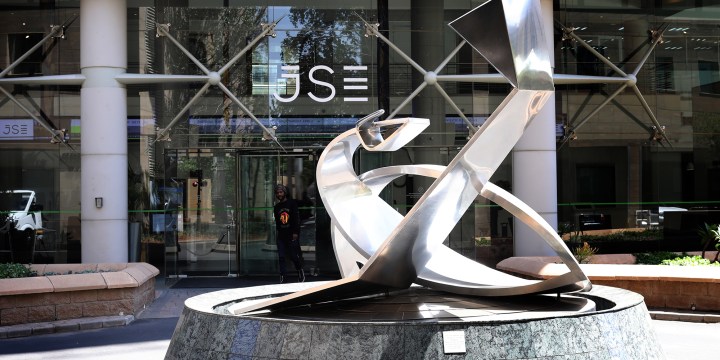BUSINESS MAVERICK
SA’s listed firms are hungry for cash

Shareholders are handy things to have when times are tough — and JSE companies are turning to them in large numbers.
South African investors have stumped up a hefty R50-billion in 2020 as JSE-listed companies turned to shareholders in the absence of other financial alternatives.
To put this in perspective, R50-billion is roughly equivalent to the market value of Nedbank or Old Mutual and a little less than Harmony or Aspen.
Companies including Pepkor, Curro, Sun International, Harmony Gold and most recently African Rainbow Capital have raised funds from shareholders.
The reasons for raising capital are not all the same and some capital raises are better than others. But at the centre of it all sits the poor economy, stretched balance sheets and the Covid-induced lockdown.
City Lodge, for instance, carries R1.3-billion debt on its balance sheet and has barely traded since March, tipping the hotelier into a precarious position. In June it tapped its bankers for an additional R200-million, which they agreed to despite the fact that it pushed the company over agreed lending limits. In July, it raised an additional R1.2-billion by way of a rights issue, which will be used to pay down some debt and prop up the balance sheet until business levels return to normal. Sun International is in a similar position.
TFG’s capital raise was far more opportunistic — and potentially value accretive for shareholders. The retailer, which under ordinary trading circumstances is highly cash generative, raised R3.95-billion to lower debt and protect its balance sheet. But as it turns out, the company also had its eye on the crown jewel within the Edcon portfolio — Jet — and after weeks of denials, made the acquisition public in late September.
Harmony Gold did not impress its investors when it called upon them to fund its $200-million purchase of mining assets from AngloGold Ashanti. The intention had been to fund this deal off its balance sheet, given the strength of the gold price. However, with net debt sitting at about R5-billion, and the mines still operating at partial capacity in May, management felt cash preservation was key, so elected to raise capital to fund the acquisition.
“This year, R50-billion has been raised through the equity market, of which 64% (R37-billion) has been raised since March this year,” says Patrycja Kula-Verster, Primary Markets Business Development Manager at the JSE. “In comparison, a total of R35-billion was raised for the entire year in 2019.”
The crisis has reminded companies that the core purpose of a public listing is to gain access to equity finance from long-term shareholders, which is handy when you need cash fast, she adds.
“While there is no singular reason for the capital raises, this quantum is highly unusual,” says Parcival Vandenhoeke, a portfolio manager with Nedcor Securities.
Usually, shareholders are supportive of rights issues that are used to fund growth. If a company like PSG came to the market, shareholders would likely view that favourably.
South African companies, in general, have stretched balance sheets. This was a function of the poor economy before Covid, so many were ill-equipped to survive the lockdown when it came, he adds.
What this has highlighted, says independent analyst Anthony Clark, is that prior to Covid-19 the market accepted a high degree of leverage and operational risk. This is now being exposed.
“As the call for cash continues, shareholders will become more circumspect in choosing who to fund and who not to fund. Shareholders are not a bottomless well from which cash can be drawn — at some point it will run dry.”
Typically companies raise capital by way of a rights issue. This gives existing shareholders the right to buy new shares in a company in proportion to the size of their existing shareholding.
To encourage shareholders to subscribe for new shares they will usually be offered at a discount to the current share price. As a rule of thumb, the more desperate the company is for cash, the bigger the discount.
The shareholder can choose to exercise that right, let the right lapse or sell that right to another investor.
Shareholders may not always be enthusiastic about stumping up the cash — it depends on the reasons for the rights issue.
In some cases companies use rights issues to recapitalise the business because the business is in distress, lenders will not lend more, the debt is spiralling and management is forced to knock on the door of its shareholders, cap in hand, as the capital providers of last resort.
Sasol is a case in point.
“The Lake Charles Chemical Project was delayed, debt was out of control, the share price is under pressure and management is forced to consider a rights issue,” says Reuben Beelders, CIO at Gryphon Asset Management. “This is a far from ideal situation.”
Struggling cement maker PPC is considering a R1.25-billion rights issue to refinance its operations. It is also negotiating with its lenders to defer repayments and provide access to further borrowings.
Investors in the construction industry will shudder at the mention of the term “rights issue” because for years the likes of M&R, Group Five and Aveng returned to shareholders for funding — with zero return.
While African Rainbow Capital raised capital to bolster its balance sheet in anticipation of opportunistic acquisitions, it annoyed its shareholders with the decision to use a third of the R750-million it raised to pay management fees.
Shareholders may feel particularly aggrieved considering that the share has fallen 66% since listing in 2017, and is hovering at R2.66. Such was the anger that the company has backtracked on this decision and will ringfence the funds for investing.
“This was a watershed moment,” says Clark. “Investors are becoming more circumspect about what they will fund and what they won’t.”
Usually shareholders are supportive of rights issues that are used to fund growth. If a company like PSG came to the market, shareholders would likely view that favourably.
“They have a reputation for good capital allocation and shareholders are likely to back them,” says Vandenhoeke.
That said, with a few notable examples, companies are not doing rights issues now because they want to, but because they have to.
“We have seen from recent bank results that companies with standby banking facilities accessed these when Covid hit,” says Beelders. “It is when the bankers won’t want to give them more money, or the cost is too high, that shareholders become the last resort. I’m surprised we haven’t seen more.” DM/BM
"Information pertaining to Covid-19, vaccines, how to control the spread of the virus and potential treatments is ever-changing. Under the South African Disaster Management Act Regulation 11(5)(c) it is prohibited to publish information through any medium with the intention to deceive people on government measures to address COVID-19. We are therefore disabling the comment section on this article in order to protect both the commenting member and ourselves from potential liability. Should you have additional information that you think we should know, please email [email protected]"
















